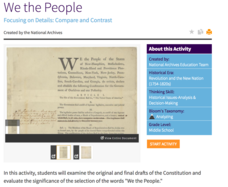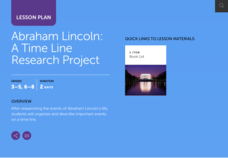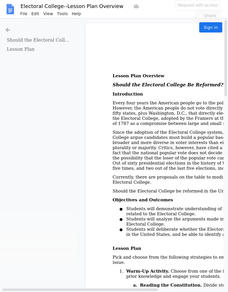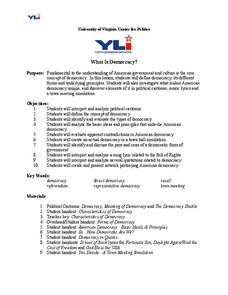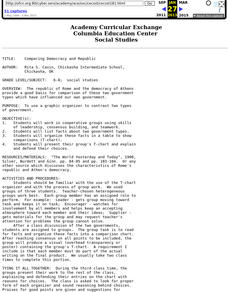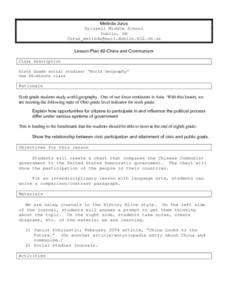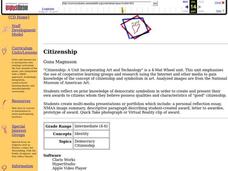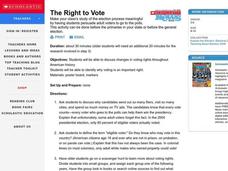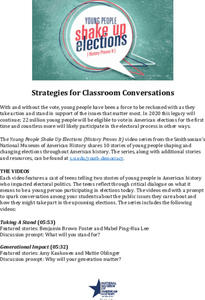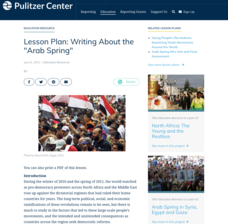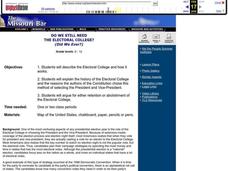US National Archives
We the People Focusing on Details: Compare and Contrast
Even the most inspiring documents in American history had to go through a few drafts before they were ready for publication. Reinforce the importance of the writing process, as well as the collaborative nature of democracy, with an...
Scholastic
Abraham Lincoln: A Time Line Research Project
Though Abraham Lincoln's life was tragically cut short, it was filled with accomplishments and inspiring moments that continue to influence American democracy. Explore the ways the 16th president of the United States made his way from a...
National Endowment for the Humanities
“Read All About It”: Primary Source Reading in “Chronicling America”
Can investigative journalism become too sensationalistic and accusatory, or is it vital for the survival of a democracy? Middle schoolers analyze primary source documents from early 20th-century newspapers as well as Theodore Roosevelt's...
Australian Human Rights Commission
An Introduction to Human Rights and Responsibilities
How are your students' rights protected? What are their responsibilities in protecting the rights of others? A lesson on human rights and the responsibilities therein introduces class members to the concepts of global citizenship,...
Judicial Learning Center
The Judge and the Jury: Trial by Jury
Why is it so important to have a trial by jury in the American judicial system? This right is one of the hallmarks of American democracy, but it also comes with the responsibility of serving on a jury if called. Young legal scholars...
Facing History and Ourselves
Standing Up to Hatred on Cable Street
The final lessons in this section of the Standing Up for Democracy unit ask class members to consider ways they can help create a "more humane, fair, and compassionate environment" in their communities. For context, learners study how...
C-SPAN
Electoral College
Most people are surprised to learn that American democracy is not as direct as they thought. Using a package of guiding questions, charts and curated videos, learners unpack the unique American institution of the Electoral College. The...
C-SPAN
Should Your State Modify Its Voter Registration Laws and Methods for Submitting a Ballot?
What is the balance between democracy and security? Using articles and videos that examine state voting procedures, learners explore the difficult question. After looking at voting regulations in their state and nationally, they consider...
Franklin D. Roosevelt Presidential Library & Museum
Voting and Participation in Decision Making
"If you don't vote - you don't count." That's the big idea in this resource about voting and participation in the democratic process. The three included activities focus students on being informed voters, practicing voting for their...
Curated OER
Greek Governments Comparison
For this World History worksheet, students compare and contrast five different Greek Government systems in a chart. They identify who ruled each type of government. In addition to, students list the characteristics and weaknesses of each...
Curated OER
Daily Life in Ancient Greece
Sixth graders discover what everyday life was like for Ancient Greeks. In this Greek history lesson, 6th graders examine the cultural diversity of Ancient Greece and how it affected daily life for its citizens.
Curated OER
What is Democracy?
Students examine civic duties. In this citizenship lesson, students play an online game that requires them to consider the needs of their community. Students campaign for the issue they choose in the game.
Curated OER
Comparing Democracy and Republic
Pupils use a graphic organizer, a T-chart, to contrast two types of government. They list facts about the two governments, and explain and defend their choice of facts to include.
Curated OER
Rocking the Vote
Students explore how a presidential candidate can win the popular vote but not receive enough electoral votes to win the election. They analyze various regions' voting trends, explore how these trends reflect the outcome of the 2004...
Curated OER
Making Democracy Work for Everyone, 1877-1904
Students investigate the culture of the post Reconstruction South. They participate in a jigsaw research activity, conduct Internet research on an assigned topic, and write a report to present to the class.
Curated OER
China and Communism
Sixth graders discuss what might happen if United States government took over media ownership, read Junior Scholastic article entitled "China Looks to the Future," and create chart comparing Chinese Communist government to United States...
Curated OER
Citizenship
Learners reflect on characteristics of good citizens, examine democratic symbolism, create an award and choose an individual to receive the award as part of this lesson on citizenship. Lesson ties together social studies, language arts,...
Curated OER
The Right to Vote
In this voting worksheet, students identify and discuss changes in voting rights throughout American history.
Then, they identify why voting is an important right for Americans. Finally, students create voting bookmarks instead of or in...
Smithsonian Institution
Young People Shake Up Elections (History Proves It) Educator Guide
Vote, it's your civic duty! The resource provides several videos about voting in the United States. Scholars watch a series of topics ranging from youth participation to civic action. The educator's guide provides teachers with...
Pulitzer Center
Writing About the "Arab Spring"
An information-rich resource, this webpage will provide your class with all the information they need to explore a relevant real-world and little understood topic: the Middle East and the people's revolutions that shook it in the spring...
Curated OER
Do We Still Need the Electoral College?
One of the most confusing aspects of any presidential election year is the role of the Electoral College. Learners read a bit about how the Electoral College works and then they hold a mock election in their classroom. They'll redraw a...
Echoes & Reflections
Nazi Germany
The Holocaust was an evolution of anti-Semitism, scapegoating, and targeted violence against Jews with Nazi policies. A resource unpacks the escalation in violence, along with the erosion of democratic institutions, during the 1930s....
Facing History and Ourselves
The Challenge of Confirmation Bias
Confirmation bias makes it difficult to overcome our preconceived notions of others. That's the big idea in a lesson plan that teaches learners strategies to recognize and question their biases.
Curated OER
Delegating Authorities
Students compare and contrast democracies around the world after reading a New York Times article. They create posters and participate in a "democracy roundtable" in which they discuss two democracies.
Other popular searches
- Ancient Greek Democracy
- Greek Democracy
- Principles of Democracy
- American Democracy
- Ancient Greece Democracy
- Direct Democracy
- Jacksonian Democracy
- Athens Democracy
- Definition of Democracy
- Representative Democracy
- What Is Democracy
- Philosophy of Democracy


